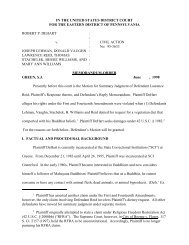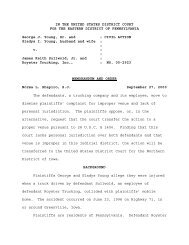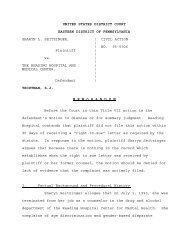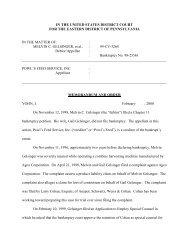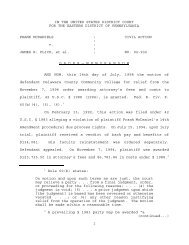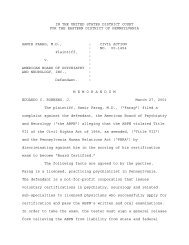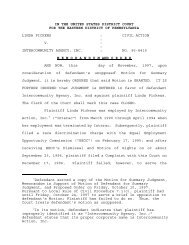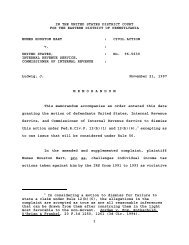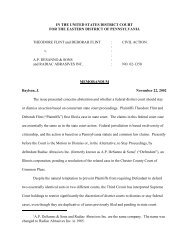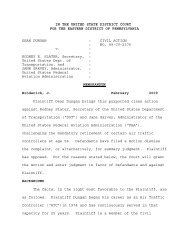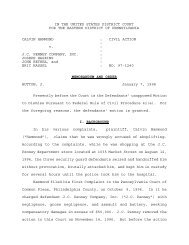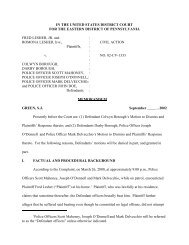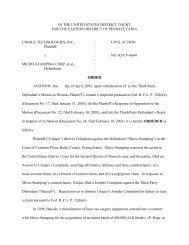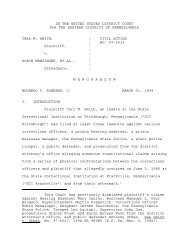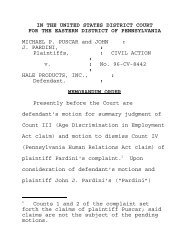1 Once a defendant has filed a motion, supported by affidavits, to ...
1 Once a defendant has filed a motion, supported by affidavits, to ...
1 Once a defendant has filed a motion, supported by affidavits, to ...
You also want an ePaper? Increase the reach of your titles
YUMPU automatically turns print PDFs into web optimized ePapers that Google loves.
IN THE UNITED STATES DISTRICT COURT<br />
FOR THE EASTERN DISTRICT OF PENNSYLVANIA<br />
MOTORUP CORPORATION : CIVIL ACTION<br />
:<br />
v. :<br />
:<br />
INTERPUBLIC GROUP OF COMPANIES :<br />
INC., WESTERN INTERNATIONAL :<br />
MEDIA CORPORATION, INC. and :<br />
FULFILLMENT HOUSE : NO. 97-7468<br />
O R D E R — M E M O R A N D U M<br />
AND NOW, this 11th day of May, 1998, the <strong>motion</strong> <strong>to</strong><br />
dismiss, Fed. R. Civ. P. 12(b)(2), 1 (3), (6), 2 or <strong>to</strong> transfer, 28<br />
U.S.C. § 1404(a) (1994), of <strong>defendant</strong>s Interpublic Group of<br />
Companies, Inc. (Interpublic), Western International Media<br />
Corporation, Inc. (Western), and Fulfillment House is denied:<br />
1. Lack of personal jurisdiction — Plaintiff’s<br />
affidavit in support of jurisdiction contains a certification <strong>by</strong><br />
the Secretary of State of California that, on Oc<strong>to</strong>ber 5, 1995,<br />
<strong>defendant</strong> Fulfillment House was merged in<strong>to</strong> <strong>defendant</strong> Western<br />
International Media Corporation. Exh. a. It also contains<br />
1 <strong>Once</strong> a <strong>defendant</strong> <strong>has</strong> <strong>filed</strong> a <strong>motion</strong>, <strong>supported</strong> <strong>by</strong><br />
<strong>affidavits</strong>, <strong>to</strong> dismiss an action for lack of personal<br />
jurisdiction, the burden shifts <strong>to</strong> plaintiff <strong>to</strong> prove “through<br />
sworn <strong>affidavits</strong> or other competent evidence” that a basis for<br />
jurisdiction exists. See Stranahan Gear Co. v. NL Industries,<br />
Inc., 800 F.2d 53, 58 (3d Cir. 1986) (quoting Time Share Vacation<br />
Club v. Atlantic Resorts, Ltd., 735 F.2d 61, 67 n.9 (3d Cir.<br />
1984)).<br />
2 Under Rule 12(b)(6), the allegations of the complaint<br />
are accepted as true, all reasonable inferences are drawn in the<br />
light most favorable <strong>to</strong> the plaintiff, and dismissal is<br />
appropriate only if it appears that plaintiff could prove no set<br />
of facts that would entitle him <strong>to</strong> relief. Weiner v. Quaker Oats<br />
Co., 129 F.3d 310, 315 (3d Cir. 1997).<br />
1
certifications <strong>by</strong> the Secretary of State of Pennsylvania that<br />
<strong>defendant</strong>s Interpublic and Western are foreign corporations<br />
qualified <strong>to</strong> do business in Pennsylvania. Id., exhs. b, c. 3<br />
Qualification as a foreign corporation under Pennsylvania<br />
law is sufficient for general jurisdiction. 42 Pa. Con. Stat. Ann.<br />
§ 5301(a)(2)(i) (West Supp. 1997); Bane v. Netlink, Inc., 925 F.2d<br />
637, 640-41 (3d Cir. 1991) (“By registering <strong>to</strong> do business in<br />
Pennsylvania, Netlink ’purposefully avail[ed] itself of the<br />
privilege of conducting activities within the forum State, thus<br />
invoking the benefits and protections of its laws.’”) (quoting<br />
Burger King Corp. v. Rudzewicz, 471 U.S. 462, 475, 105 S. Ct. 2174,<br />
2183, 85 L. Ed.2d 528 (1985) (further citation omitted)). Inasmuch<br />
as Fulfillment House and Western appear <strong>to</strong> be a single entity, and<br />
both<br />
Western and Interpublic are qualified <strong>to</strong> do business in<br />
Pennsylvania, personal jurisdiction over them exists.<br />
2. Improper venue — The existence of personal<br />
jurisdiction in this district enables venue. See 28 U.S.C.<br />
§ 1391(a)(3), (c) (1994).<br />
3. Alter ego liability (All Counts) — Western and<br />
Fulfillment House are one entity. Plaintiff’s affidavit, exh. a.<br />
Any liability on the part of Fulfillment<br />
House is imputable <strong>to</strong><br />
Western. The complaint also alleges direct as well as alter ego<br />
liability. 8-14, 44. Given the allegations that <strong>defendant</strong>s are<br />
3 Interpublic is a Delaware corporation qualified <strong>to</strong> do<br />
business in Pennsylvania since 1966. Plaintiff’s affidavit, exh.<br />
d. Western is a California corporation qualified <strong>to</strong> do business<br />
in Pennsylvania since 1988. Id.<br />
2
1) inseparable, 12, and 2) defrauded plaintiff, 77-81, the<br />
complaint is sufficient <strong>to</strong> withstand the <strong>motion</strong>. See Lycoming<br />
County Nursing Home Assn. v. Commonwealth of Pa., 156 Pa. Commwlth.<br />
280, 290, 627 A.2d 238, 243-44 (1993) (corporate veil will be<br />
pierced on alter ego theory upon showing that controlling<br />
corporation ignored separate status of subsidiary corporation and<br />
used it <strong>to</strong> perpetrate fraud).<br />
4. Breach of contract (Count I) — This claim, complaint<br />
21-29, is sufficiently stated. See General State Authority v.<br />
Coleman Cable & Wire Co., 27 Pa. Commwlth. 385, 365 A.2d 1347<br />
(1976); Advanced Lifeline Services, Inc. v. Northern Health<br />
Facilities, Inc., C.A. No. 97-3757, 1997 WL 763024, at *3 (E.D. Pa.<br />
Dec. 9, 1997).<br />
5. Duty of good faith and fair dealing (Count II) —<br />
Inasmuch as a fiduciary relationship is alleged <strong>to</strong> have been<br />
created <strong>by</strong> the parties’ agreement, 24-26 (plaintiff supplied<br />
<strong>defendant</strong>s with inven<strong>to</strong>ry in trust and confidential cus<strong>to</strong>mer list),<br />
the complaint states a claim for breach of the duties of good faith<br />
and fair dealing under Pennsylvania law.<br />
See Commonwealth of Pa.<br />
v. E-Z Parks, Inc., 153 Pa. Commwlth. 258, 268, 620 A.2d 712, 717<br />
(business<br />
relationship may be the basis of a confidential<br />
relationship if one party surrenders substantial control over<br />
portion of his affairs <strong>to</strong> the other), appeal denied, 534 Pa. 651,<br />
627 A.2d 181 (1993).<br />
6. Breach of fiduciary relationship (Count IV) — see<br />
supra 5.<br />
3
7. Fraud (Count VII) — Fraud is alleged with requisite<br />
particularity, Fed. R. Civ. P. 9(b). Complaint, 31-37, 77-81.<br />
See Shapiro v. UJB Financial Corp., 964 F.2d 272, 284 (3d Cir.),<br />
cert. denied, 506 U.S. 934, 113 S. Ct. 365, 121 L. Ed.2d 278<br />
(1992).<br />
8. Theft of trade secrets (Count VIII) — Confidential<br />
cus<strong>to</strong>mer lists are entitled <strong>to</strong> trade secret protection under<br />
Pennsylvania common law. See Morgan’s Home Equipment Corp. v.<br />
Martucci, 390 Pa. 618, 624-25, 136 A.2d 838, 842-43 (1957);<br />
Kwatkoski v. National Railroad Passenger Corp., C.A. No. 91-5637,<br />
1993 WL 185567, at *16 (E.D. Pa. May 27, 1993), aff’d, 79 F.3d 1138<br />
(3d Cir. 1996).<br />
9. Trademark infringement (Count IX) — The complaint<br />
alleges, 32, 39, 87-95, that <strong>defendant</strong>s re-packaged and sold<br />
plaintiff’s<br />
product for their own benefit under the guise of a<br />
“special offer.”<br />
This conduct, if true, gives rise <strong>to</strong> a claim<br />
under the Lanham Act, 15 U.S.C. § 1125(a)(1) (1994).<br />
See Polymer<br />
Technology Corp. v. Mimran, 975 F.2d 58, 61-62 (3d Cir. 1992).<br />
10. Copyright infringement (Count X) — According <strong>to</strong> the<br />
complaint, no sale occurred. Instead, <strong>defendant</strong>s are alleged <strong>to</strong><br />
have held plaintiff’s inven<strong>to</strong>ry in trust <strong>to</strong> distribute it at<br />
plaintiff’s price. 22, 24-26. Since <strong>defendant</strong>s were not the<br />
owners of the inven<strong>to</strong>ry, the “first sale doctrine,” 17 U.S.C.<br />
§ 109(a) (1994), is inapplicable.<br />
4
11. RICO (Count XII) — Defendants’ <strong>motion</strong> is denied<br />
without prejudice <strong>to</strong> reconsideration upon submission of plaintiff’s<br />
RICO Case Order Statement. See RICO Case Order, dated May 5, 1998.<br />
12. Transfer under 28 U.S.C. § 1404(a) — Defendants<br />
invoke § 1404(a) without arguing any of the public or private<br />
interest fac<strong>to</strong>rs pertinent <strong>to</strong> a transfer inquiry.<br />
Defendants’<br />
memorandum, at 27. Plaintiff’s choice of forum is a paramount<br />
consideration and should not be disturbed lightly, see Jumara v.<br />
State Farm Insurance Co., 55 F.3d 873, 880 (3d Cir. 1995). Here,<br />
it can not be said that all — or even most — of the public and<br />
private interests point <strong>to</strong> the transferee requested <strong>by</strong> <strong>defendant</strong>s,<br />
the Northern District of Texas, id. at 879-80 (delineating<br />
§ 1404(a) public and private interests).<br />
Edmund V. Ludwig, J.<br />
5



